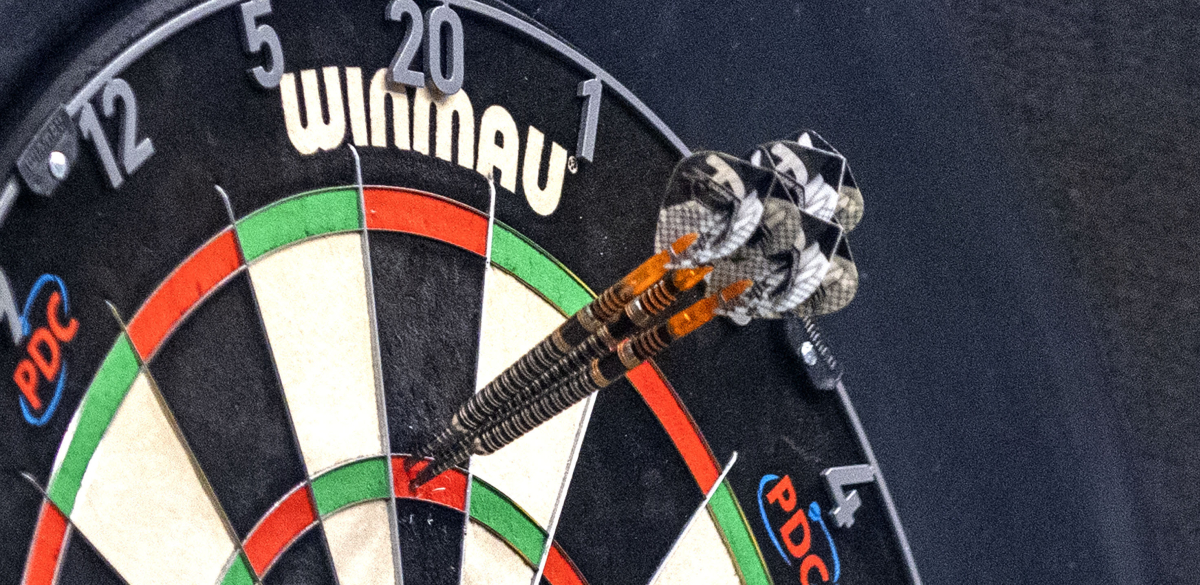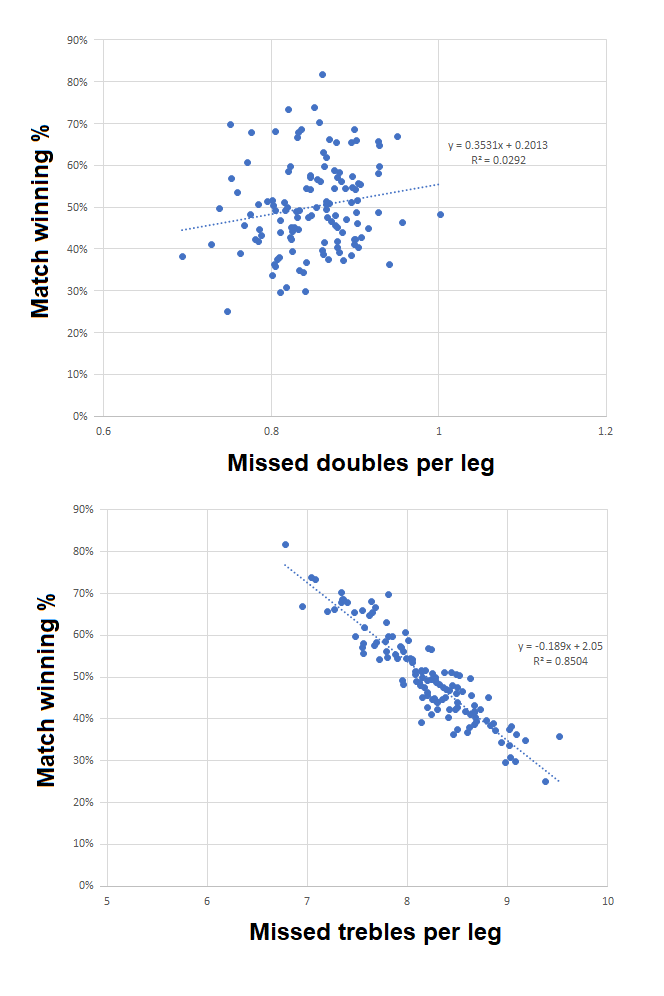
PDC stats analyst Christopher Kempf discusses the renowned "Trebles for Show, doubles for dough" principle ahead of this year's BoyleSports World Grand Prix.

Darts' famous adage: "Trebles for show, doubles for dough" was coined by Bobby George, a man with a great deal of experience in both aspects of the sport, and it is one that has informed the behaviour of generations of darts players.
The conventional wisdom holds that time spent practicing doubles is better spent than hours passed in racking up 140s and 180s, because of the unique importance of checkouts in the game of 501.
A missed last dart at double - when it results in an opponent returning to the board to win the leg -certainly appears to be the proximate cause of a loss, just as a timely double or bullseye appears to be the cause of winning.
Missing the first target of a leg is no death knell for the leg; missing the last always is.
However, is that famous phrase really an accurate portrayal of the importance of doubles in relation to trebles in darts?
After all, between 80% and 90% of the darts thrown in the game of 501 land in the close vicinity of the three highest scoring targets on the board.
Can a player effectively compensate for his inaccuracy on tops by scoring heavily on treble 20, thus giving him as many attempts as he needs at the former target to win the leg?
Let's consider the treble and double percentages for individual ProTour matches. Does a higher overall accuracy, across hundreds of legs, correlate with winning?
The answer is yes, but as one might expect, the correlations for neither treble nor double are very strong.
It is, after all, possible for a player to win a match with 100% (6/6) of doubles hit as it is for him to lose a match with 100% (1/1) of doubles hit.
But the correlation is slightly weaker for doubles, and an incremental increase in a player's treble percentage is more likely to result in a win than a similar corresponding increase in doubles percentage.
There is too much variance in individual match data; players often record 100% doubles accuracy in one match, and then 0% in the next. These are sensible objections, so let's turn to the total percentages, across many hundreds of matches, for individual players.
Are the best double hitters more likely to win than the best treble hitters? Even though there is substantial overlap between these two groups of players, the answer is no.
The top ProTour players are naturally excellent at both, but a high treble percentage is more likely to predict a high match-winning percentage.
Consider that the 13 most prolific players from 2018-2022, with two exceptions [James Wade and Mensur Suljovic], are also the Pro Tour's most accurate treble hitters.
The same correspondence does not exist with doubles accuracy: six of the same 13 most frequently victorious players on the ProTour do not even make the top 16 when it comes to finishing.
Again, maybe this is not the appropriate way to measure doubles proficiency - a percentage obscures the number of attempts and their distribution throughout the match.
What of the rate at which players miss doubles per leg played? This comparison produces the most astonishing result of this entire investigation.
Additional missed double attempts are correlated [however weakly] with an INCREASED likelihood of having won the match, while additional missed treble attempts are correlated very strongly with a DECREASED likelihood of having won.
Michael van Gerwen illustrates this phenomenon well. The three-time World Champion is the only player from 2018 onwards to have won 80% of his Pro Tour matches, but he misses 0.86 doubles per leg, which is only slightly above the average for the PDC.
Van Gerwen is simultaneously the player with the lowest rate of missed trebles per leg, and one of only two players with fewer than seven.
If there is any causal relationship between MvG's frequently indifferent doubling and his match-winning percentage, it is a result of earning more attempts with the heaviest scoring of any player in darts.
Indeed, the reigning World Matchplay champion's finishing percentage is lower than that of 60% of Tour Card Holders, yet it is not a fatal flaw in his game.
In his Winter Gardens final against Gerwyn Price, Van Gerwen had darts to win 28 of the 32 legs he played and lost ten of them, finishing the match with barely more than 1/3 accuracy on doubles - and the title.
A look at the graphs of the missed doubles and trebles per leg illustrates this relationship nicely. Players who miss very few doubles per leg (fewer than 0.75) have match winning percentages anywhere from 25 to 70.
There is little discernible trend in the data as one moves towards more or fewer missed doubles.
Yet there is a clear correspondence between the number of trebles missed per leg and winning percentage; for every additional missed treble that a player throws per leg, his overall match winning percentage decreases by 18.9%.
The best indication of a viable player on the ProTour seems to be throwing, on average, fewer than 8.5 missed trebles for leg; no similar statement can be made for a player's number of missed doubles.
So, was Bobby George wrong? If he meant to say that no leg is definitively won without hitting the final double, then certainly not. Within the frame of the individual leg, the finishing double always takes centre stage.
However, when we zoom out to the frame of reference of 1000s of legs, we see that many legs are effectively won in the first visits when double attempts are 'earned' - in the broader context, power scoring is the clearest and most reliable determinant of winning a leg.
Thus players can rest assured that practicing groupings in the big trebles and switching among them is time better spent than usually thought - there's plenty of dough to be had from each 180, too.
Analysis of Pro Tour data, 2018-2022
Individual match:
Correlation coefficient of win % with treble %: 0.369
Correlation coefficient of win % with double %: 0.354
Correlation coefficient of win % with # missed treble attempts: -0.242
Correlation coefficient of win % with # missed double attempts: 0.150
Player:
Correlation coefficient of win % with treble %: 0.911
Correlation coefficient of win % with double %: 0.778
Correlation coefficient of win % with # missed treble attempts per leg: -0.922*
Correlation coefficient of win % with # missed double attempts per leg: 0.171

